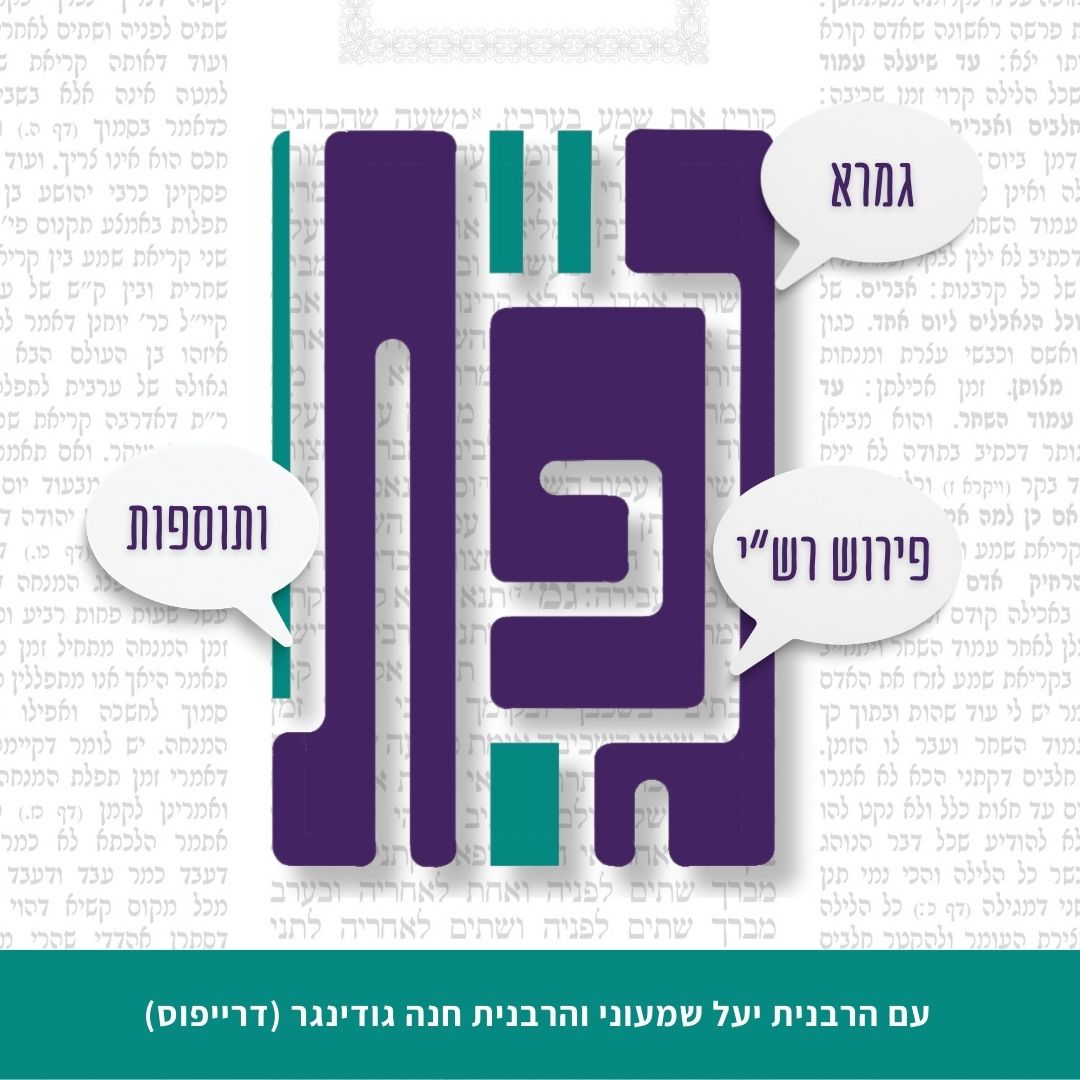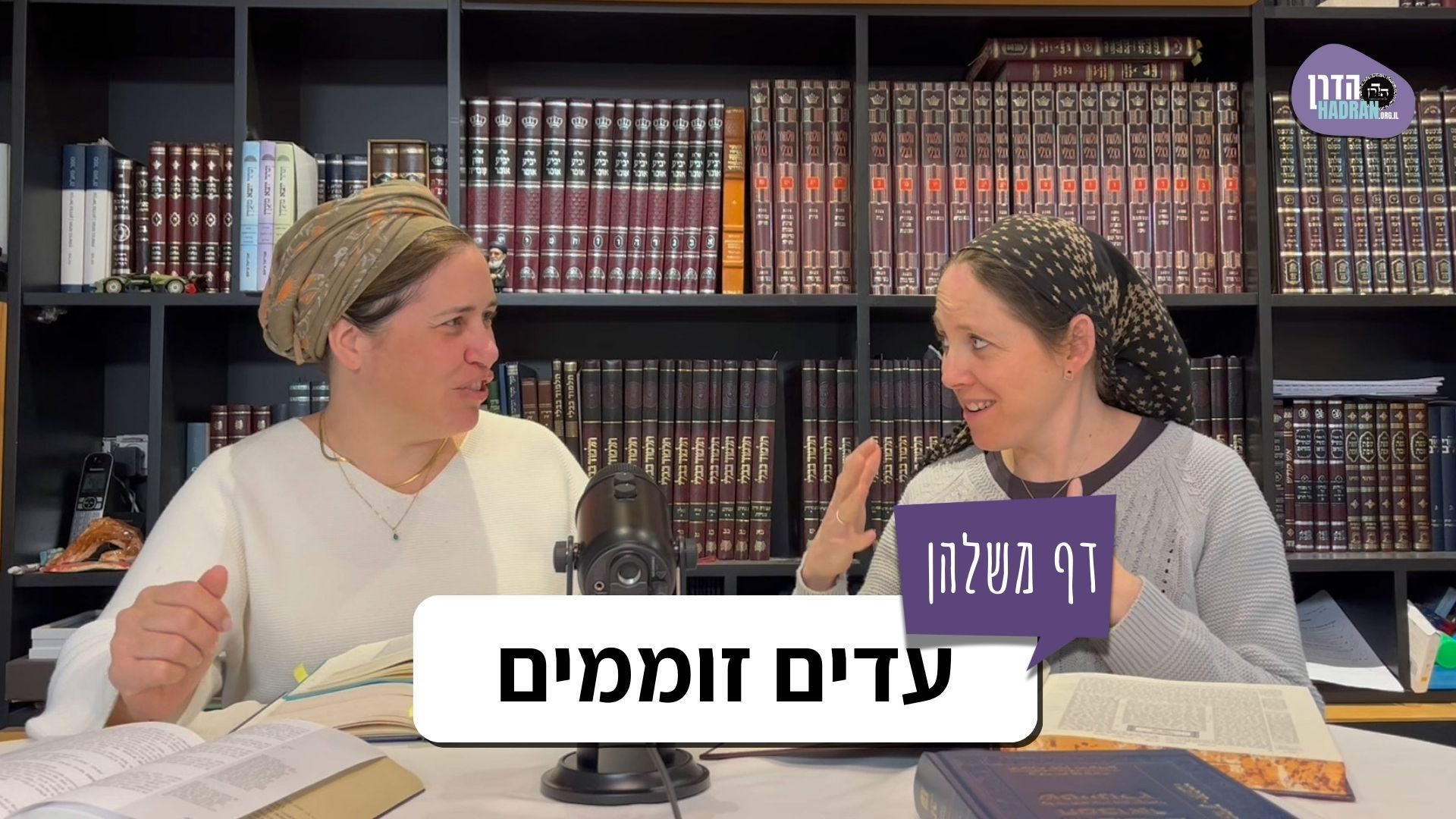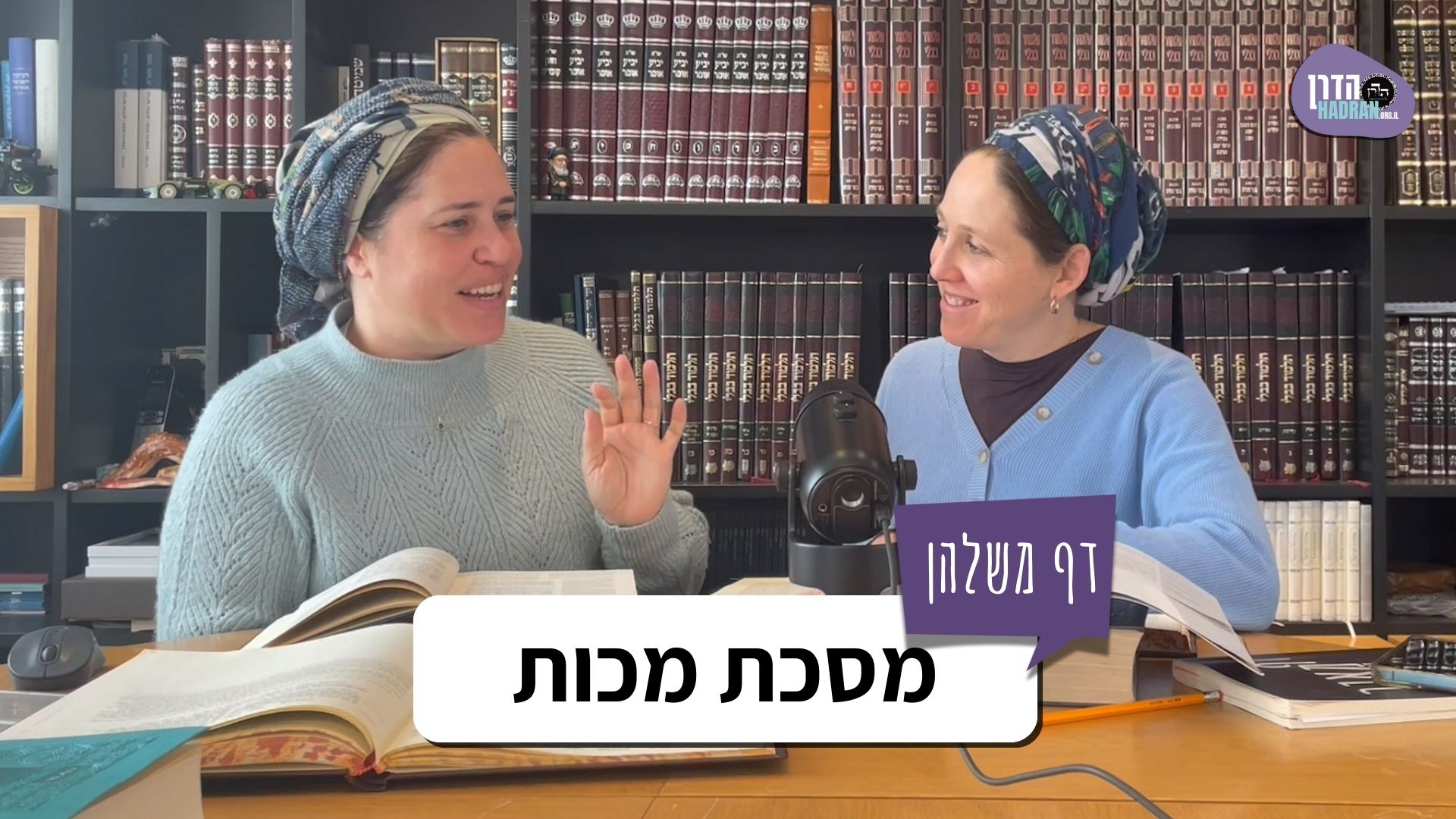מכות טו
אָמְרוּ לוֹ: אָמַרְתָּ? אֲמַר לְהוּ: לָא. אָמַר רַבָּה: הָאֱלֹהִים! אַמְרַהּ, וּכְתִיבָא וּתְנֵינָא: כְּתִיבָא – ״וִישַׁלְּחוּ מִן הַמַּחֲנֶה [וְגוֹ׳]״ ״וְלֹא יְטַמְּאוּ אֶת מַחֲנֵיהֶם״. תְּנֵינָא – הַבָּא לַמִּקְדָּשׁ טָמֵא.
They said to Rabbi Yoḥanan: Did you say this halakha? Rabbi Yoḥanan said to them: No. Rabba bar bar Ḥana said in the form of an oath: By God, he said it, and this halakha is written in the Torah and we learn it in the mishna. It is written: “And they shall send from the camp any man who is leprous, and any zav…and they shall not render their camp impure” (Numbers 5:2–4). There is a prohibition against rendering the camp impure, and there is a positive mitzva to send them out of the camp. Since the positive mitzva precedes and is independent of the prohibition, one is flogged for the violation of that prohibition, as we learn in the mishna among those liable to receive lashes: One who entered the Temple while ritually impure.
אֶלָּא מַאי טַעְמָא קָא הָדַר בֵּיהּ? מִשּׁוּם דְּקַשְׁיָא לֵיהּ אוֹנֶס. דְּתַנְיָא: אוֹנֵס שֶׁגֵּירַשׁ, אִם יִשְׂרָאֵל הוּא – מַחְזִיר וְאֵינוֹ לוֹקֶה. אִם כֹּהֵן הוּא – לוֹקֶה וְאֵינוֹ מַחְזִיר.
The Gemara asks: Rather, what is the reason he retracted his statement and claimed he did not say it? The Gemara answers: It is due to the fact that the halakha concerning one who rapes a virgin young woman, who is required by Torah law to marry her and for whom it is prohibited to divorce her as long as he lives, is difficult for him, as it is taught in a baraita: In the case of a rapist who divorced the woman he raped, if he is a non-priest, he remarries her, and he is not flogged for violating the prohibition: “He may not send her away all his days” (Deuteronomy 22:29). If he is a priest, he is flogged for violating the prohibition, and he does not remarry her because it is prohibited for him to marry a divorcée.
אִם יִשְׂרָאֵל הוּא – מַחְזִיר וְאֵינוֹ לוֹקֶה, אַמַּאי? לֹא תַעֲשֶׂה שֶׁקְּדָמוֹ עֲשֵׂה הוּא, וְלִילְקֵי!
The Gemara elaborates: If he is a non-priest, he remarries her, and he is not flogged. Why? It is a prohibition that has a positive mitzva which preceded it, as the positive mitzva: “And she shall be his wife” (Deuteronomy 22:29), precedes the prohibition “He may not send her away.” But let him be flogged, since he violated the prohibition by divorcing her. Apparently, one is not flogged even if the positive mitzva precedes the prohibition.
אָמַר עוּלָּא: לֹא יֵאָמֵר ״לוֹ תִּהְיֶה לְאִשָּׁה״, בְּאוֹנֵס, וְלִיגְמַר מִמּוֹצִיא שֵׁם רַע: וּמָה מוֹצִיא שֵׁם רַע שֶׁלֹּא עָשָׂה מַעֲשֶׂה – אָמַר רַחֲמָנָא ״וְלוֹ תִהְיֶה לְאִשָּׁה״, אוֹנֵס לֹא כׇּל שֶׁכֵּן?
Ulla says in response: The positive mitzva in the case of a rapist is not a mitzva that precedes the prohibition. Rather, it follows the prohibition and rectifies it, as it is referring to a case of one who married his victim and then divorced her. Let the verse not state: “And she shall be his wife,” in the case of a rapist, and let us derive it by means of an a fortiori inference from the case of one who defames his bride, claiming that she was not a virgin when he consummated the marriage: If in the case of a defamer, who did not perform an action but sinned through speech, the Merciful One states: “And she shall be his wife” (Deuteronomy 22:19), then in the case of a rapist, who performed an action, is it not all the more so that he is obligated to take her as a wife?
לָמָּה נֶאֱמַר? אִם אֵינוֹ עִנְיָן לְפָנָיו תְּנֵהוּ עִנְיָן לְאַחֲרָיו, שֶׁאִם גֵּירַשׁ יַחֲזִיר.
Ulla continues: Why, then, is the mitzva stated in the case of the rapist? If it is not relevant to the matter of before the rapist marries the victim, apply it to the matter of after the rapist marries the victim, teaching that if he divorced her he must remarry her. Although in the verse it appears prior to the prohibition “He may not send her away,” it actually serves to rectify that prohibition.
וְאַכַּתִּי, אוֹנֵס מִמּוֹצִיא שֵׁם רָע לָא גָּמַר, דְּאִיכָּא לְמִיפְרַךְ: מָה לְמוֹצִיא שֵׁם רַע, שֶׁכֵּן לוֹקֶה וּמְשַׁלֵּם!
The Gemara asks: But still, this affords no proof, as one cannot derive the case of a rapist from the case of a defamer, as the a fortiori inference can be refuted: What is notable about the case of a defamer, which is more stringent than the case of a rapist? It is notable in that he is flogged and is liable to pay retribution, which is contrary to the principle that in general, two punishments are not administered for one transgression.
אֶלָּא: לֹא יֵאָמֵר ״לוֹ תִהְיֶה לְאִשָּׁה״ בְּמוֹצִיא שֵׁם רַע, וְלִיגְמַר מֵאוֹנֵס: וּמָה אוֹנֵס שֶׁאֵינוֹ לוֹקֶה וּמְשַׁלֵּם, אָמַר רַחֲמָנָא ״וְלוֹ תִהְיֶה לְאִשָּׁה״, מוֹצִיא שֵׁם רַע לֹא כׇּל שֶׁכֵּן? וְלָמָּה נֶאֱמַר? אִם אֵינוֹ עִנְיָן לַמּוֹצִיא שֵׁם רַע – תְּנֵהוּ עִנְיָן לָאוֹנֵס, אִם אֵינוֹ עִנְיָן לְפָנָיו – תְּנֵהוּ עִנְיָן לְאַחֲרָיו.
The Gemara suggests: Rather, let the verse not state: “And she shall be his wife,” in the case of the defamer, and let us derive it by means of an a fortiori inference from the case of a rapist: And if in the case of a rapist, who is not both flogged and liable to pay restitution, but is liable to receive only one punishment, the Merciful One states: “And she shall be his wife,” in the case of a defamer, who is flogged and liable to pay retribution, is it not all the more so that he is obligated to take her as a wife? And why, then, is it stated in the case of the defamer? Rather, if the mitzva is not relevant to the matter of the defamer, apply it to the matter of the rapist, and if the mitzva is not relevant to the matter of before the rapist marries the victim, apply it to the matter of after the rapist marries the victim, teaching that if he divorced her he must remarry her. Although in the verse it appears prior to the prohibition “He may not send her away,” it actually serves to rectify that prohibition.
וּמוֹצִיא שֵׁם רַע מֵאוֹנֵס נָמֵי לָא גָּמַר, דְּאִיכָּא לְמִיפְרַךְ: מָה לְאוֹנֵס – שֶׁכֵּן עָשָׂה מַעֲשֶׂה!
The Gemara asks: But this affords no proof, as one cannot derive the case of a defamer from the case of a rapist either, as the a fortiori inference can be refuted: What is notable about the case of a rapist? It is notable in that he performed an action, while the defamer performed no action.
אֶלָּא: לֹא יֵאָמֵר ״לוֹ תִהְיֶה לְאִשָּׁה״ בְּמוֹצִיא שֵׁם רַע, שֶׁהֲרֵי אִשְׁתּוֹ הִיא. לָמָּה נֶאֱמַר? אִם אֵינוֹ עִנְיָן לַמּוֹצִיא שֵׁם רַע – תְּנֵהוּ עִנְיָן לָאוֹנֵס, וְאִם אֵינוֹ עִנְיָן לְפָנָיו – תְּנֵהוּ עִנְיָן לְאַחֲרָיו.
The Gemara suggests: Rather, let the verse not state: “And she shall be his wife,” in the case of the defamer because the expression is redundant, as she is already his wife. It would have been sufficient for the verse to state that it is prohibited for him to send her away. Why, then, is it stated in the case of the defamer? Rather, if the mitzva is not relevant to the matter of the defamer, apply it to the matter of the rapist, and if the mitzva is not relevant to the matter of before the rapist marries the victim, apply it to the matter of after the rapist marries the victim, teaching that if he divorced her he must remarry her. Although the positive mitzva appears in the verse prior to the prohibition “He may not send her away,” it actually serves to rectify that prohibition.
וְאֵימָא, וְאִם אֵינוֹ עִנְיָן לְפָנָיו דְּמוֹצִיא שֵׁם רַע – תְּנֵהוּ עִנְיָן לְאַחֲרָיו דִּידֵיהּ, דְּלָא לָקֵי!
The Gemara questions that derivation: And say instead: And if the mitzva is not relevant to the matter of the defamer before he marries his bride, as they are married, apply it to the matter of the defamer himself after they are married, teaching that if he divorced her and violated the prohibition against divorcing her, he is obligated to remarry her, and it teaches that he is not flogged, as the positive mitzva rectifies the prohibition. But in the case of a rapist, the mitzva is to marry her after the rape but there is no mitzva to marry her after he divorces her, and nevertheless, he is not flogged.
אִין הָכִי נָמֵי, וְאָתֵי אוֹנֵס וְגָמַר מִינֵּיהּ. בְּמַאי גָּמַר מִינֵּיהּ? אִי בְּקַל וָחוֹמֶר אִי בְּ״מָה מָצִינוּ״ – אִיכָּא לְמִיפְרַךְ כִּדְפָרְכִינַן: מָה לְמוֹצִיא שֵׁם רַע, שֶׁכֵּן לֹא עָשָׂה מַעֲשֶׂה!
The Gemara answers: Yes, it is indeed so; the halakha is derived with regard to the defamer himself, teaching that if he divorces his bride he is obligated to remarry her. And the case of the rapist comes and is derived from the case of the defamer, and the same halakha applies there as well. The Gemara asks: With what derivation is the case of a rapist derived from the case of a defamer? If it is by means of an a fortiori inference or if it is by means of the inductive hermeneutical principle: What do we find, those derivations can be refuted, as we refuted the derivations earlier in the Gemara: What is notable about the case of a defamer? It is notable in that he did not perform an action.
אֶלָּא אָמַר רָבָא: כׇּל יָמָיו בַּעֲמוֹד וְהַחְזֵר. וְכֵן כִּי אֲתָא רָבִין אָמַר רַבִּי יוֹחָנָן: כׇּל יָמָיו בַּעֲמוֹד וְהַחְזֵר.
Rather, Rava says: From where is it derived that a rapist must remarry his victim if he divorced her because the positive mitzva rectifies the prohibition “He may not send her away”? It is derived from the superfluous phrase: “All his days” (Deuteronomy 22:29), indicating that all his days, even after he marries and divorces her, he is obligated to arise and remarry her and is consequently not liable to receive lashes. The Gemara adds: And likewise, when Ravin came from Eretz Yisrael to Babylonia, he said that Rabbi Yoḥanan says: All his days he is obligated to arise and remarry her.
אֲמַר לֵיהּ רַב פָּפָּא לְרָבָא: וְהָא לָא דָּמֵי לָאוֵיהּ לְלָאו דַּחֲסִימָה! אֲמַר לֵיהּ: מִשּׁוּם דִּכְתַב בֵּיהּ רַחֲמָנָא עֲשֵׂה יַתִּירָא מִגְרָע גָּרַע?
Rav Pappa said to Rava that a question arises with regard to Rabbi Yoḥanan’s statement that one is flogged for violating a prohibition preceded by a positive mitzva: But isn’t its prohibition dissimilar to the prohibition of muzzling an ox while it is threshing grain (see Deuteronomy 25:4), which is the paradigm for all prohibitions for whose violation one is flogged, as no positive mitzva is stated in conjunction with the prohibition of muzzling? Rava said to him: Is it reasonable to say that due to the fact that the Merciful One wrote in its regard an additional positive mitzva, the stringency of the prohibition lessens, so that no lashes are administered?
אִי הָכִי, לָאו שֶׁנִּיתָּק לַעֲשֵׂה נָמֵי, לֵימָא: מִשּׁוּם דִּכְתַב בֵּיהּ רַחֲמָנָא עֲשֵׂה יַתִּירָא מִגְרָע גָּרַע? אֲמַר לֵיהּ: הָהוּא לְנַתּוֹקֵי לָאו הוּא דַּאֲתָא.
Rav Pappa objected to this claim: If so, with regard to a prohibition that entails fulfillment of a positive mitzva as well, let us say: Is it reasonable to say that due to the fact that the Merciful One wrote in its regard an additional positive mitzva, the stringency of the prohibition lessens, so that no lashes are administered? Rava said to him: In that case, the transgressor is not flogged because the mitzva comes to sever the prohibition from the punishment of lashes.
הָנִיחָא לְמַאן דְּאָמַר בִּיטְּלוֹ וְלֹא בִּיטְּלוֹ,
The Gemara returns to the statement of Rava, who said with regard to the rapist: All his days he is obligated to arise and remarry her, and that is why he is not flogged for violating the prohibition “He may not send her away,” and asks: This works out well according to the one who says that the criterion for determining whether one is flogged for violating a prohibition that entails fulfillment of a positive mitzva is whether he nullified the mitzva or did not nullify the mitzva. According to this opinion, one is flogged only if fulfillment of the mitzva is no longer possible, e.g., a priest who divorced the woman whom he raped. By contrast, a non-priest would not be flogged, because the option of remarriage remains viable.
אֶלָּא לְמַאן דְּאָמַר קִיְּימוֹ וְלֹא קִיְּימוֹ, מַאי אִיכָּא לְמֵימַר?
But according to the one who says that the criterion for determining whether one is flogged in that case is whether he fulfilled the mitzva or did not fulfill the mitzva, and if he did not immediately fulfill the mitzva he is flogged, what can be said? Even in the case of a non-priest who divorced the rape victim, once he fails to remarry her immediately, he is liable to receive lashes.
מִידֵּי הוּא טַעְמָא אֶלָּא לְרַבִּי יוֹחָנָן? הָאָמַר לֵיהּ רַבִּי יוֹחָנָן לְתַנָּא, תְּנִי: בִּטְּלוֹ – חַיָּיב, וְלֹא בִּטְּלוֹ – פָּטוּר.
The Gemara answers: The only reason Rava stated his explanation, that all his days he is obligated to arise and remarry her and that is why the rapist is not flogged even though it is a prohibition preceded by a positive mitzva, is to explain the opinion of Rabbi Yoḥanan, who said that for any prohibition that has a positive mitzva which preceded it, everyone agrees that one is flogged for its violation. Didn’t Rabbi Yoḥanan say to the tanna who would recite the mishnayot and baraitot in the study hall: Teach that if he nullified the mitzva, he is liable to receive lashes, and if he did not nullify the mitzva, he is exempt from lashes? According to Rabbi Yoḥanan, it works out well.
דְּתָנֵי תַּנָּא קַמֵּיהּ דְּרַבִּי יוֹחָנָן: כׇּל מִצְוַת לֹא תַעֲשֶׂה שֶׁיֵּשׁ בָּהּ קוּם עֲשֵׂה, קִיֵּים עֲשֵׂה שֶׁבָּהּ – פָּטוּר, בִּיטֵּל עֲשֵׂה שֶׁבָּהּ – חַיָּיב.
What is the dispute to which the Gemara is alluding? The tanna taught a baraita before Rabbi Yoḥanan: With regard to any prohibition that entails a command to arise and perform a mitzva, if he fulfilled the positive mitzva that is entailed therein, he is exempt from lashes, and if he nullified the positive mitzva that is entailed therein, he is liable to receive lashes.
אֲמַר לֵיהּ: מַאי קָא אָמְרַתְּ? קִיֵּים – פָּטוּר, לֹא קִיֵּים – חַיָּיב, בִּיטֵּל – חַיָּיב, לֹא בִּיטֵּל – פָּטוּר! תְּנִי: בִּיטְּלוֹ וְלֹא בִּיטְּלוֹ. וְרַבִּי שִׁמְעוֹן בֶּן לָקִישׁ אוֹמֵר: קִיְּימוֹ וְלֹא קִיְּימוֹ.
Rabbi Yoḥanan said to the tanna: What is it that you are saying? The baraita that you recited is self-contradictory, as based on the first clause: If he fulfilled the mitzva he is exempt, apparently, if he did not fulfill the mitzva he is liable. Yet based on the latter clause: If he nullified the mitzva, he is liable, apparently, if he did not nullify the mitzva he is exempt, even though he failed to fulfill the mitzva. Rather, teach: If he nullified the mitzva, he is liable to receive lashes, and if he did not nullify the mitzva, he is exempt from lashes. And Rabbi Shimon ben Lakish says: The formulation of the baraita must be consistent; therefore, teach: If he fulfilled the mitzva, he is exempt, and if he did not fulfill the mitzva he is liable.
בְּמַאי קָא מִיפַּלְגִי? בְּהַתְרָאַת סָפֵק קָא מִיפַּלְגִי, מָר סָבַר: הַתְרָאַת סָפֵק שְׁמָהּ הַתְרָאָה,
The Gemara inquires: With regard to what matter do they disagree? They disagree with regard to uncertain forewarning, i.e., forewarning concerning a transgression with regard to which it will not be clarified whether or not his action will render him liable to receive lashes. One Sage, Rabbi Yoḥanan, holds: Uncertain forewarning is characterized as forewarning; therefore, even if it is unclear whether the action that the transgressor is about to perform will render him liable to receive lashes, he can be forewarned, and if he violates the prohibition in a manner that will render him liable, he is flogged.
וּמָר סָבַר: הַתְרָאַת סָפֵק לֹא שְׁמָהּ הַתְרָאָה.
And one Sage, Reish Lakish, holds: Uncertain forewarning is not characterized as forewarning. According to Rabbi Yoḥanan, the rapist is forewarned when he is about to divorce his wife, even though there is uncertainty whether he will nullify the mitzva. If he nullifies the mitzva, e.g., if he vows that deriving benefit from his ex-wife is forbidden to him, thereby ensuring that he cannot remarry her, he is flogged. Reish Lakish holds that if one’s liability to receive lashes was dependent upon the nullification of the mitzva, the rapist would never be flogged, as in that case the forewarning would of necessity be uncertain. Therefore, he explains that the criterion for determining whether one is flogged is whether he fulfilled the mitzva immediately. Violating the prohibition renders him liable to receive lashes; he may then choose to be flogged or to fulfill the mitzva. Therefore, when he is forewarned that he will be flogged if he divorces her, it is not uncertain forewarning.
וְאָזְדוּ לְטַעְמַיְיהוּ, דְּאִיתְּמַר: ״שְׁבוּעָה שֶׁאוֹכַל כִּכָּר זֶה הַיּוֹם״, וְעָבַר הַיּוֹם וְלֹא אֲכָלָהּ, רַבִּי יוֹחָנָן וְרֵישׁ לָקִישׁ דְּאָמְרִי תַּרְוַיְיהוּ: אֵינוֹ לוֹקֶה. רַבִּי יוֹחָנָן אוֹמֵר: אֵינוֹ לוֹקֶה,
And they follow their standard lines of reasoning, as it was stated that Rabbi Yoḥanan and Reish Lakish disagreed in a case where one said: On my oath I will eat this loaf today, and the day passed and he did not eat it. Rabbi Yoḥanan and Reish Lakish both say: He is not flogged for taking a false oath. They disagree with regard to the reason that he is not flogged. Rabbi Yoḥanan says: He is not flogged,

























